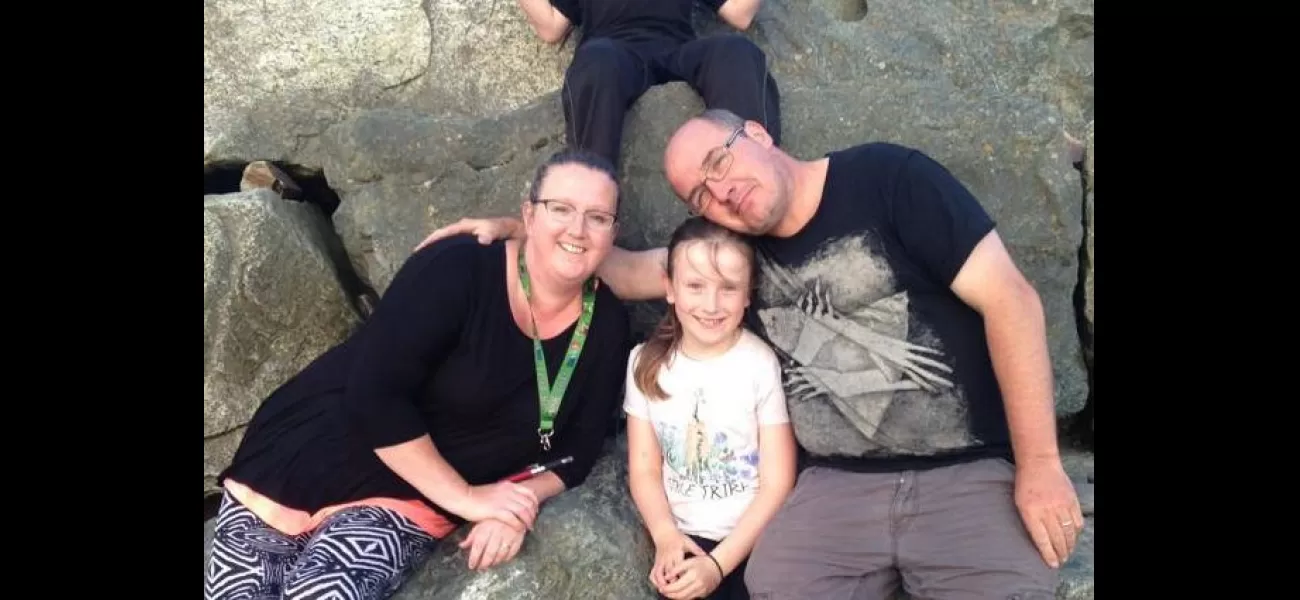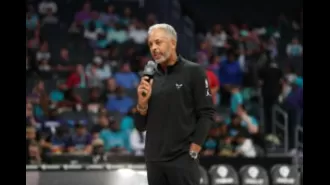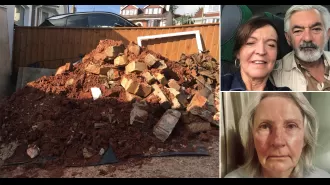My spouse developed a headache and began behaving strangely. Later, I was warned that I might lose him.
February 27th 2024.

"I want to work in social care," I told Richard, my husband. It was a bold statement, but one that came from the depths of my heart. Little did I know that this would become my true calling in life.
It all started on the worst day of my life, when my husband had a brain haemorrhage at the young age of 40. I remember vividly the image of him lying in the hospital bed, covered in a tangled mess of wires, still conscious as the doctor delivered the devastating news that he might not make it.
As I sobbed uncontrollably, Richard squeezed my hand and whispered reassuring words, even in the midst of his own pain and fear. I never could have imagined that such a tragedy would lead me to discover my passion for social care.
In February 2015, Richard suffered a massive brain bleed caused by an unexpected inflammation of the brain. It was a shock to our family, as we were just like any other normal family before this happened. I was a stay-at-home mom to our four children, while Richard worked as a manager at a hardware shop. We loved spending our weekends together, going on country walks, fishing, and camping.
But then, one day, Richard came home from work complaining of a headache. I didn't think much of it at first, but then he started saying strange things and complained of not being able to move his legs. That's when I knew something was seriously wrong and rushed him to the hospital. Little did I know, it was just the beginning of a long and difficult journey.
For days, I sat by Richard's side, praying for his recovery and refusing to believe the doctors when they said he might not make it. And then, miraculously, after a week, he woke up. He couldn't speak, but he was alive. From that moment on, I became his full-time carer, with the help of the nurses who taught me how to use a hoist to wash and dress him. And even though it was challenging, I felt a sense of purpose and fulfillment in taking care of him.
Eventually, Richard came home from the hospital, but he still needed my care and support. I helped him with his personal needs and assisted him in re-learning how to speak and write with the help of a speech and language therapist. It was tough, but seeing the progress he made filled me with inspiration and a desire to help others in similar situations.
It was during this time that I realized my natural ability to support and care for others. "I want to work in social care," I told Richard, as I felt a strong pull towards this field. As the kids grew older and Richard's health improved, I finally had the opportunity to pursue a new career of my own.
I started working as a carer in the community and then moved on to work in a care home. But my ultimate dream came true when I got a job at Mencap, supporting people with learning disabilities. It was the perfect fit for me, as I found joy and fulfillment in helping others overcome their challenges and achieve their goals.
Being a support worker is no easy task. It requires patience, compassion, and determination. But the rewards are endless. I support three ladies with learning disabilities, and it's incredible to see how much they have taught me in return. We do activities together, like going to the gym and cooking, and I feel blessed to be a part of their lives.
My experience caring for Richard has given me valuable skills that I use every day in my role as a support worker. And even though the hours can be long and it can be hard to switch off, I find real job satisfaction in making a positive impact on someone's life.
It's a shame that the social care sector is often undervalued and underfunded. We should do everything in our power to protect and support it, as we will all need it at some point in our lives. That's why I fully support Mencap's "Why We Care" campaign, which aims to raise awareness and urge the government to better fund social care.
For now, I will continue to do what I love, knowing that I am making a difference in people's lives. And as for Richard, he has made a remarkable recovery and is back at work. He is proud of the work I do and our experience has brought us even closer together. It's amazing to think that something as tragic as his brain haemorrhage led me to my true calling and the opportunity to give back to others.
It all started on the worst day of my life, when my husband had a brain haemorrhage at the young age of 40. I remember vividly the image of him lying in the hospital bed, covered in a tangled mess of wires, still conscious as the doctor delivered the devastating news that he might not make it.
As I sobbed uncontrollably, Richard squeezed my hand and whispered reassuring words, even in the midst of his own pain and fear. I never could have imagined that such a tragedy would lead me to discover my passion for social care.
In February 2015, Richard suffered a massive brain bleed caused by an unexpected inflammation of the brain. It was a shock to our family, as we were just like any other normal family before this happened. I was a stay-at-home mom to our four children, while Richard worked as a manager at a hardware shop. We loved spending our weekends together, going on country walks, fishing, and camping.
But then, one day, Richard came home from work complaining of a headache. I didn't think much of it at first, but then he started saying strange things and complained of not being able to move his legs. That's when I knew something was seriously wrong and rushed him to the hospital. Little did I know, it was just the beginning of a long and difficult journey.
For days, I sat by Richard's side, praying for his recovery and refusing to believe the doctors when they said he might not make it. And then, miraculously, after a week, he woke up. He couldn't speak, but he was alive. From that moment on, I became his full-time carer, with the help of the nurses who taught me how to use a hoist to wash and dress him. And even though it was challenging, I felt a sense of purpose and fulfillment in taking care of him.
Eventually, Richard came home from the hospital, but he still needed my care and support. I helped him with his personal needs and assisted him in re-learning how to speak and write with the help of a speech and language therapist. It was tough, but seeing the progress he made filled me with inspiration and a desire to help others in similar situations.
It was during this time that I realized my natural ability to support and care for others. "I want to work in social care," I told Richard, as I felt a strong pull towards this field. As the kids grew older and Richard's health improved, I finally had the opportunity to pursue a new career of my own.
I started working as a carer in the community and then moved on to work in a care home. But my ultimate dream came true when I got a job at Mencap, supporting people with learning disabilities. It was the perfect fit for me, as I found joy and fulfillment in helping others overcome their challenges and achieve their goals.
Being a support worker is no easy task. It requires patience, compassion, and determination. But the rewards are endless. I support three ladies with learning disabilities, and it's incredible to see how much they have taught me in return. We do activities together, like going to the gym and cooking, and I feel blessed to be a part of their lives.
My experience caring for Richard has given me valuable skills that I use every day in my role as a support worker. And even though the hours can be long and it can be hard to switch off, I find real job satisfaction in making a positive impact on someone's life.
It's a shame that the social care sector is often undervalued and underfunded. We should do everything in our power to protect and support it, as we will all need it at some point in our lives. That's why I fully support Mencap's "Why We Care" campaign, which aims to raise awareness and urge the government to better fund social care.
For now, I will continue to do what I love, knowing that I am making a difference in people's lives. And as for Richard, he has made a remarkable recovery and is back at work. He is proud of the work I do and our experience has brought us even closer together. It's amazing to think that something as tragic as his brain haemorrhage led me to my true calling and the opportunity to give back to others.
[This article has been trending online recently and has been generated with AI. Your feed is customized.]
[Generative AI is experimental.]
0
0
Submit Comment





